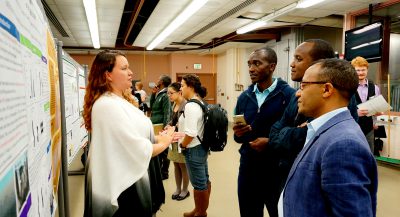
On October 6, faculty members, students, and scholars attended the MSU College of Veterinary Medicine’s 27th Annual Phi Zeta Research Day, a colloquium that showcases the research of students and faculty from the MSU College of Veterinary Medicine and affiliated departments and colleges across the University.
Participants in Phi Zeta Research Day presented their research orally or with a poster, and were judged in various categories, including presentation and scholarship. Each year, the event is presented in conjunction with Phi Zeta, the honorary society of veterinary medicine. It allows individuals from across the University to celebrate the advancements in research made throughout the past year.
“Research is central to advancing our knowledge and to improving the lives of animals and humans; research is also a highly collaborative effort,” says Dr. Vilma Yuzbasiyan-Gurkan, associate dean for Research and Graduate Studies. “Phi Zeta Research Day allows us to recognize and celebrate the achievements of our students, faculty members, and their research teams. The range and depth of the studies are impressive, integrating basic understanding of biological processes and improving and implementing therapies in the clinic.”

Participating in Phi Zeta Research Day gives students the chance to explore research areas that may become part of their career trajectory. It also promotes the investigation of new ideas that support the advancement of science that benefits both humans and animals. Most of the research reflects the work of collaborative teams between the College of Veterinary Medicine and other MSU colleges, fostering world-class research and strengthening the University-wide learning environment.
This year, more than 90 veterinary students, master and doctoral students, residents, interns, undergraduates, and faculty presented their research. During the award ceremony, Dr. Paul Bartlett, professor in the Department of Large Animal Clinical Sciences, was presented with the Zoetis Award for Veterinary Research Excellence for his research efforts in bovine leukemia virus, a growing problem in dairy herds in the US, as well as his contributions to public health through his focus on infectious disease control, which is critical for human and animal health and economic viability.
“Dr. Bartlett has made—and continues to make—significant contributions in animal health research and public health, and he’s a great choice for this award,” says Yuzbasiyan-Gurkan. “His research in the last five years has focused on bovine leukemia virus, a significant and growing problem in US cattle. He has formed a collaborative team including many researchers with different strengths in our College and extending to industry and to studies in farms across Michigan and many other states. The team is already having a significant impact in identifying and implementing ways to control this disease. Dr. Bartlett also has been a leader in stemming the rise of antimicrobial resistance, both in the research and education arenas, especially through the development of accessible, web-based modules to improve understanding of antimicrobial use and impact on public health, as well as of disease surveillance. The team’s work was reflected in five presentations by his graduate students on this Phi Zeta Day, which in turn reflects the research and impact Phi Zeta Day celebrates.”

Dr. Srinand Sreevatsan gave this year’s keynote address. Sreevatsan has assumed the position of chair of the College’s Department of Pathobiology and Diagnostic Investigation as of July 2017. He is an accomplished researcher who has employed genomics and proteomics tools to understand the pathogenesis and the transmission of mycobacterium species across animal and human populations.
In Michigan, the toll of mycobacteria, which causes tuberculosis in the deer and cattle population, is well known, and the concerns involve the health of the animals and the effect on trade and economy. Sreevatsan’s studies involve collaborations across the US and throughout the world. His research goals include development of easy to use and reliable diagnostic tools that can be applied patient-side, in the field, in farms, and in hospitals, for humans and animals. Such approaches can help with both early diagnosis and with implementation of the correct therapy, reducing and circumventing antimicrobial resistance. In addition, his team is investigating novel ways to immunize deer and wildlife populations.
Sreevatsan’s keynote presentation for Phi Zeta Research Day was titled “Addressing the Challenge of Tuberculosis in the Animal-Human Interface Using Genomic Epidemiology.” Yuzbasiyan-Gurkan says Sreevatsan’s depth of knowledge in regard to tuberculosis, how it affects human and animal populations, and his research to lessen its impact offered Phi Zeta Research Day attendees key insights into this global concern.
“We were excited to have Dr. Sreevatsan give our keynote address,” says Yuzbasiyan-Gurkan. “His research on tuberculosis and translational medicine is especially valuable as TB remains one of the major global threats to human health. With highly resistant TB strains emerging across the globe, we need new approaches to treatment of this disease. Such advances only can come from deep understanding of the biology of this pathogen. Dr. Sreevatsan and his collaborators are employing creative approaches at every level, at the bench, in drug development, and in population and farm management practices. By working to lessen the prevalence of tuberculosis in the wild, Dr. Sreevatsan is helping to lessen the transmission rate to domestic cattle and other animal populations, thereby protecting both animals, the farmers who raise them, the public, and our food supply.”
To learn more about Phi Zeta Research Day, visit cvm.msu.edu/phizetaday.
Awards
- Best Oral Presentation by a PhD Student; Calvin Pohl (CMIB, mentor: Adam Moeser) on the cholinergic response in bacterial enteritis
- Best Oral Presentation by a DVM Student; Lauren Smyth (mentor: Vilma Yuzbasiyan-Gurkan) on a novel treatment for histolytic sarcoma
- Best Poster Presentation by a PhD Student; Seungeun Han (CMIB, mentor: Jean Tsao) on transmission of tick born disease Borrelia Myamotoi
- Best Poster Presentation by a Undergraduate Student; Elyse Eldredge (mentor: Jack Harkema) on ozone induced rhinitis
- Best Oral Presentation by a Resident, Intern, or MS Student; Kyan Thelen (CMIB MS student, mentor: Andres Contreras) on adipogenic differentiation
- Best Poster Presentation by a Resident, Intern, or MS Student; Jaimie Strickland (Resident/CMIB MS student, mentor: John Buchweitz) on hepatic copper and lipid oxidation
- Best Oral Presentation by a DVM Student; Emma Stapley (mentor: Jane Manfredi) on insulin dysregulation in horses
- Honorable Mention for Best Poster Presentation by a DVM Student: Nicole Insko (mentor: Ning Li) on atmospheric pollutants and the immune response
- Honorable Mention for Best Poster Presentation by a PhD Student: Nidia Maradiaga (mentor: Adam Moeser) on mast cell hyperactivity in gastrointestinal disease
